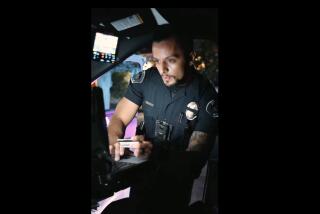SOUTH-CENTRAL : Police to Be Trained in Mexican Culture
In an effort to strengthen community ties, the Los Angeles Police Department has established a program to educate officers in Spanish and in Mexican culture.
The program, which began this month with the training of 31 senior-lead officers from the South Bureau, is one of the department’s latest attempts to bridge the gap between the Latino neighborhoods of South-Central and the police. Many residents immigrated from countries where police are dishonest or have been linked to death squads. Often, police say, they are afraid to officially report crimes or would rather remain silent, fearing that police will turn them over to the Immigration and Naturalization Service.
“It’s very, very important in our department that we understand the (diversity) of Los Angeles,” said Deputy Chief Mark Kroeker, commander of the South Bureau, which extends from South-Central to the harbor.
The program is a joint project between the Los Angeles Consulate of Mexico, the University of Guadalajara and the Police Department.
The first phase of the program consists of classroom instruction in which officers attend weekly three-hour sessions taught by members of the University of Guadalajara. The classes include instruction in basic Spanish conversational skills. The officers will attend lectures on Mexican life, history, geography, demographics, arts and culture, and on the life of Mexican immigrants in the United States.
Officers who successfully complete the six-month classroom portion then enter the second phase, in which they will live for 10 days with a family in Guadalajara. During that visit, the officers will be exposed to such things as language usage and cultural awareness. During their time with the host families, they see firsthand the everyday life of a Mexican family.
Police officials will evaluate the first two phases in January, then determine whether the program should be expanded departmentwide as the third and final phase.
The first phase of the $17,000 program has been funded by Lilly Artenstein for Euro Star. The shoe company donated $4,000. “I feel businesses should participate in education, and this is our contribution,” said Artenstein, whose business is in South Los Angeles.
At about $14,000, flying the 34 officers to Guadalajara is the most expensive element of the program.
Kroeker is seeking financing for the second phase and is confident the money will be provided.
“I honestly believe that after this program we’ll come back changed in our attitude and understanding,” Kroeker said.
More to Read
Sign up for Essential California
The most important California stories and recommendations in your inbox every morning.
You may occasionally receive promotional content from the Los Angeles Times.










